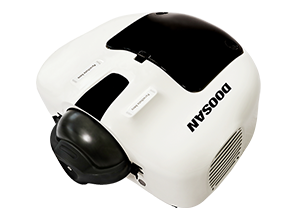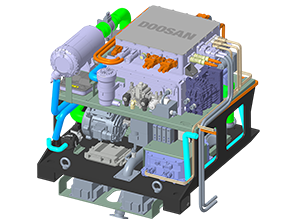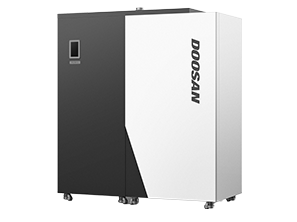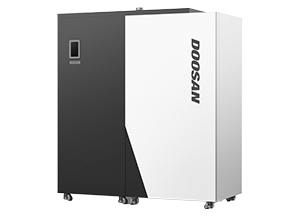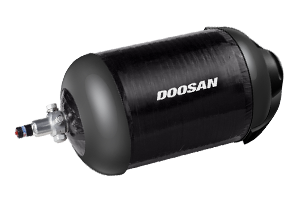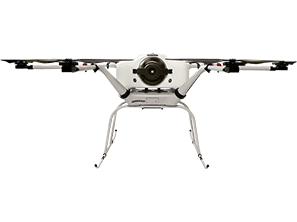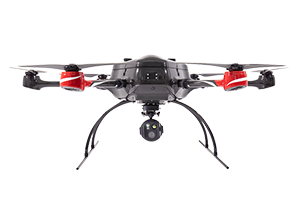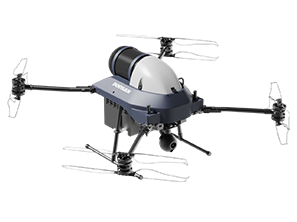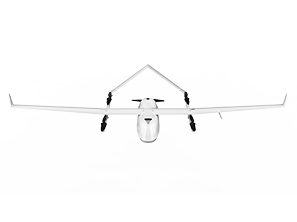News
Doosan Mobility Innovation and Korea Forestry Promotion Institute Sign Business Agreement on Hydrogen Fuel Cell-Powered Drone Development
2018.07.31
On July 31, the Korea Forestry Promotion Institute (Kofpi) and Doosan Mobility Innovation, which has the core technology needed to produce hydrogen fuel cell powerpacks, signed a business agreement at Kofpi’s Pile Wilt Disease Monitoring Center in Daejeon and committed to cooperate with each other for the development of hydrogen fuel cell-powered drones for forestry use at a time when the hydrogen energy market is starting to be recognized as a basic energy form of the country.
Currently, China dominates 94% of the global commercial drone market. This means that nine out of ten drones that ordinary consumers can buy in the market are made in China. Most of these drones use lithium polymer batteries; if hydrogen fuel cell-powered drones developed using Korean technoloy become commercialized against this backdrop, not only will this activate the domestic drone market and provide Korea a great opportunity to boast its technological excellence to the world but also allow drones to be used in various ways in the forestry sector as drones will finally be able to fly for around two-hours.
While a lithium polymer battery drone can be operated for around ten to thirty minutes, a drone that uses hydrogen gas can be operated for around two hours. The short flight time of existing drones has limited it from being applied to various on-site operations, but hydrogen fuel cell-powered drones will be free from time constraints.
Another strength of hydrogen fuel cells is that, it does not take much time or effort to recharge them. The time it takes to charge a lithium battery drone is sixty to ninety minutes while it takes only about ten minutes to charge a hydrogen fuel cell drone. Also, users of hydrogen fuel cell drones can prevent crashes and other accidents caused by low batteries since they can accurately predict when they need to replace batteries.
This business agreement is particularly meaningful in that it is a public-private partnership aimed at creating a drone ecosystem for forestry use, revitalizing the domestic drone market, and expanding the use of drones in forests, which are goals pursued by Kofpi.
“Through this agreement, we will jointly develop hydrogen fuel cell drones that can be used in long-hour operations in large areas of forests,” said President Gilbon Koo of Kofpi. “I hope that we will be able to achieve our two goals of expanding the drone market for forestry use and increasing the efficiency of the forestry business.”
Currently, China dominates 94% of the global commercial drone market. This means that nine out of ten drones that ordinary consumers can buy in the market are made in China. Most of these drones use lithium polymer batteries; if hydrogen fuel cell-powered drones developed using Korean technoloy become commercialized against this backdrop, not only will this activate the domestic drone market and provide Korea a great opportunity to boast its technological excellence to the world but also allow drones to be used in various ways in the forestry sector as drones will finally be able to fly for around two-hours.
While a lithium polymer battery drone can be operated for around ten to thirty minutes, a drone that uses hydrogen gas can be operated for around two hours. The short flight time of existing drones has limited it from being applied to various on-site operations, but hydrogen fuel cell-powered drones will be free from time constraints.
Another strength of hydrogen fuel cells is that, it does not take much time or effort to recharge them. The time it takes to charge a lithium battery drone is sixty to ninety minutes while it takes only about ten minutes to charge a hydrogen fuel cell drone. Also, users of hydrogen fuel cell drones can prevent crashes and other accidents caused by low batteries since they can accurately predict when they need to replace batteries.
This business agreement is particularly meaningful in that it is a public-private partnership aimed at creating a drone ecosystem for forestry use, revitalizing the domestic drone market, and expanding the use of drones in forests, which are goals pursued by Kofpi.
“Through this agreement, we will jointly develop hydrogen fuel cell drones that can be used in long-hour operations in large areas of forests,” said President Gilbon Koo of Kofpi. “I hope that we will be able to achieve our two goals of expanding the drone market for forestry use and increasing the efficiency of the forestry business.”


